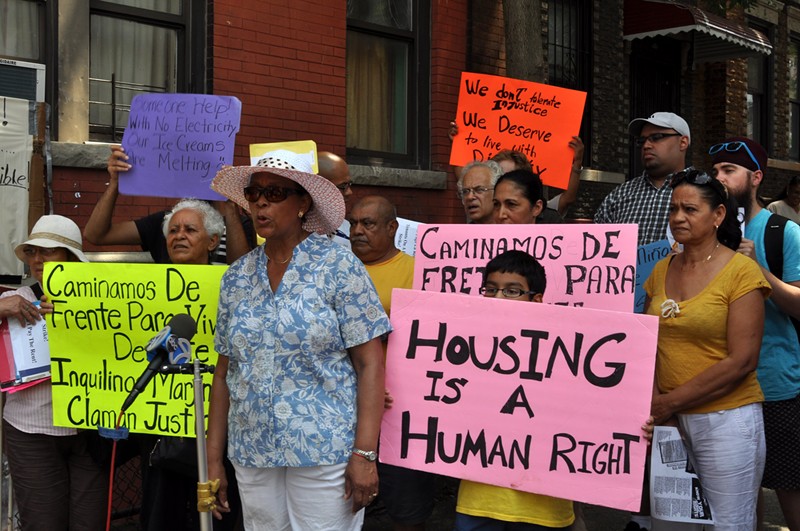Miami-Dade County is facing an unprecedented housing crisis, with rapidly spiking rents and homeless shelters at or beyond capacity. Over the past year, local tenants have faced a wave of evictions after the county's COVID-19 eviction moratorium expired in July 2021. Many were unable to hire an attorney to help them stay in their homes.
Today at 10 a.m., the Miami Workers Center will hold a press conference outside the Miami-Dade County Courthouse at 73 W. Flagler St. to call for support for a "right to counsel" program that would ensure tenants in a housing dispute are guaranteed legal representation, much like a public defender.
"We see lots of landlords intimidating people, shutting off utilities, and ignoring things they have to repair when people don't know their rights. Having a tenants' right to counsel would change the power imbalance between landlord and tenant," says Lizzie Suarez, communications manager for the Miami Workers Center, a nonprofit tenant advocacy group.
According to Suarez, fewer than 2 percent of Miami tenants who face eviction in housing court have access to a lawyer. On the other side of the bench, about 90 percent of landlords in Miami-Dade County bring legal representation.
When that happens, Suarez explains, tenants may be coerced into signing agreements they don't understand — especially if they don't speak English — or they might not be familiar with their legal rights under the county's Tenant Bill of Rights.
Under the bill, tenants are afforded a number of protections under local law, including the right to a 60-day advanced eviction notice, and the right to repair an issue in a property and deduct the cost from their rent if the landlord ignores repeated requests to fix it.
"One of the big issues is people not knowing their rights," Suarez tells New Times. "People see a 15- or 30-day eviction notice and don't realize that's illegal. They go into panic mode and look for a new place, when in fact they can fight it."
County Commissioner Eileen Higgins, who introduced an ordinance requiring landlords to give a 60-day notice of rent increases above 5 percent, says her office's phone lines have been flooded this year with residents complaining that they were being evicted and couldn't hire a lawyer.
"Our phone was ringing off the hook with evictions and landlord-tenant disputes. We referred people to Legal Services of Greater Miami, but what we realized is essentially they didn't have the resources to help everyone," Higgins says.
After working with Legal Services, the Community Justice Project, and the Miami Workers Center, Higgins sponsored an item up for discussion by the Board of County Commissioners on July 19 that will direct Mayor Daniella Levine Cava to assess the need for a right-to-counsel program for tenants in housing disputes.
The item asks the mayor to conduct a study to gauge how many residents have a real need for legal representation in housing court and which nonprofits are available to help, with the aim of creating a pilot program covered by county's upcoming 2022-'23 budget. In an emailed statement to New Times, the mayor says she looks forward to partnering with Higgins on the item.
Cava notes that her office is working to address the affordability crisis through a variety of projects under the Building Blocks Program, which includes increasing the stock of affordable housing and improving tenant protections. A right-to-counsel program would be another prong of the approach.
"Our response to the affordability crisis, the Building Blocks program, is a comprehensive approach that expands the supply of affordable housing and increases tenant protections at the same time," Cava writes. "To meet the County's housing needs, we have to simultaneously address land-use, funding needs, along with creating new tenant protections, from the Tenant Bill of Rights to the Right to Counsel."
Suarez says the Workers Center has estimated that a multiyear pilot program will cost the county about $3 million, which would cover hiring attorneys and creating an infrastructure that will simplify access to representation.
Other cities have enacted similar programs and met with success.
New York City passed a right-to-counsel law in 2017, at a time when only 1 percent of tenants facing eviction had legal representation. By the last quarter of 2021, with the law in place, 74 percent of tenants in eviction proceedings had an attorney, and 84 percent of those who had an attorney were able to stay in their homes, according to the city's Office of Civil Justice.
A similar program in San Francisco boasts a 67 percent success rate in keeping people housed, though the city has struggled to find enough lawyers to meet demand.
Higgins explains that while there are plenty of reasons for legitimate legal evictions to occur — such as when a tenant destroys property or forgoes rent payments for no reason — helping to provide legal representation will ensure the system is fair.
"Right now it's a completely lopsided system. This just gives a chance to equalize those numbers so tenants can at least get their voices heard," she says.













